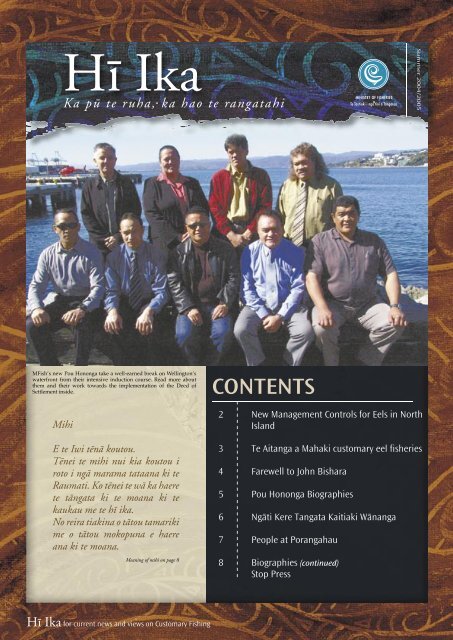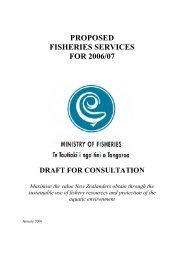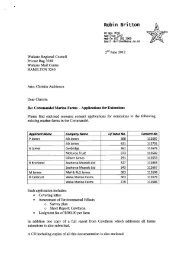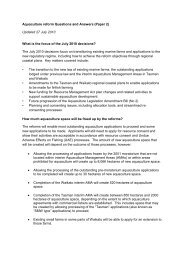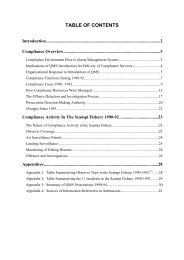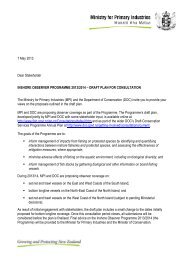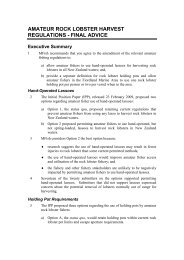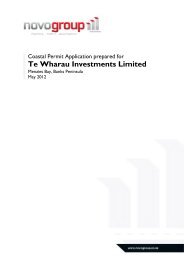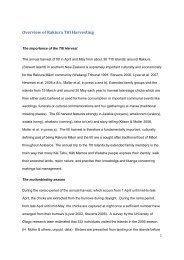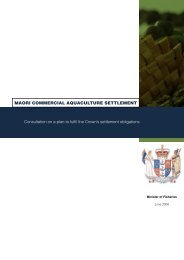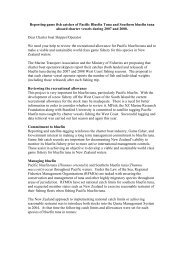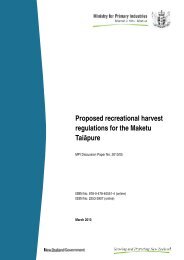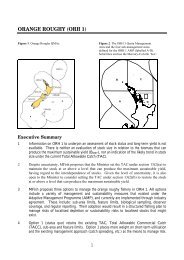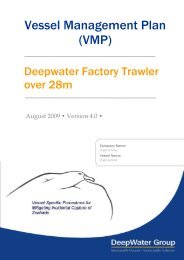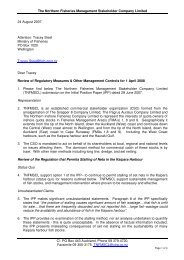Create successful ePaper yourself
Turn your PDF publications into a flip-book with our unique Google optimized e-Paper software.
<strong>Hï</strong> <strong>Ika</strong><br />
Ka pü te ruha, ka hao te rangatahi<br />
MFish’s new Pou Hononga take a well-earned break on Wellington’s<br />
waterfront from their intensive induction course. Read more about<br />
them and their work towards the implementation <strong>of</strong> the Deed <strong>of</strong><br />
Settlement inside.<br />
Mihi<br />
E te Iwi tënä koutou.<br />
Tënei te mihi nui kia koutou i<br />
roto i ngä marama tataana ki te<br />
Raumati. Ko tënei te wä ka haere<br />
te tängata ki te moana ki te<br />
kaukau me te hï ika.<br />
No reira tiakina o tätou tamariki<br />
me o tätou mokopuna e haere<br />
ana ki te moana.<br />
Meaning <strong>of</strong> mihi on page 8<br />
<strong>Hï</strong> <strong>Ika</strong> for current news and views on Customary Fishing<br />
CONTENTS<br />
2 New Management Controls for Eels in North<br />
Island<br />
3 Te Aitanga a Mahaki customary eel fisheries<br />
4 Farewell to John Bishara<br />
5 Pou Hononga Biographies<br />
6 Ngäti Kere Tangata Kaitiaki Wänanga<br />
7 People at Porangahau<br />
8 Biographies (continued)<br />
Stop Press<br />
Summer 2004/2005
New Management Controls<br />
for Eels in the North Island<br />
In 2003, the Minister <strong>of</strong> <strong>Fisheries</strong> decided to introduce the<br />
North Island eel fishery into the QMS on 1 October 2004 to<br />
bring it into line with the South Island and the Chatham<br />
Islands.<br />
MFish recognises that this is an important customary and<br />
recreational fishery, and a taonga <strong>of</strong> great spiritual value to<br />
Maori.<br />
The North Island eel commercial fishery, which started in<br />
the mid 1960s, had restricted numbers <strong>of</strong> fishers by the mid<br />
1980s, but no catch limit. Before the introduction <strong>of</strong> the fishery<br />
into the QMS, it was necessary to determine the nature and<br />
extent <strong>of</strong> the stocks to be managed and the catch limits and<br />
allowances for those stocks.<br />
Consultation hui and meetings have been held and<br />
submissions closed in April 2004. In July 2004, the Minister<br />
produced a decision paper that:<br />
• Re-stated key elements <strong>of</strong> the Maori fisheries settlement<br />
legislation<br />
• Encouraged further contact between fishery interests,<br />
perhaps through the development <strong>of</strong> forums, to discuss<br />
common issues<br />
• Decided to set TACs under section 14 <strong>of</strong> the Act<br />
• Proposed a management strategy for the fishery over the<br />
next 10 years to<br />
- improve average size<br />
- increase the number <strong>of</strong> eels<br />
- halt any decline over the short term.<br />
As a result, the overall commercial catch in the North Island has<br />
been reduced by 8.25 percent for shortfin eels and 17.8 percent<br />
for longfin eels, in comparison to recent commercial landings.<br />
As eel species only breed once, at the end <strong>of</strong> their life, there<br />
will be closures to help spawning. All commercial fishing is<br />
prohibited from:<br />
• Motu and Mohaka River catchments<br />
• Most <strong>of</strong> the Whanganui River catchment, excluding<br />
- western tributaries <strong>of</strong> Tangarakau, Ohura and<br />
Ongarue River sub-catchments<br />
- ponds and dams not connected to tributaries or<br />
rivers flowing into Whanganui<br />
- the lower stem <strong>of</strong> the Whanganui River within its<br />
tidal reaches<br />
All commercial fishing will also be prohibited from areas <strong>of</strong><br />
special significance to customary Maori interests, being:<br />
• Interconnected lakes Taharoa, Numuti, Rotoroa and Lake<br />
Harihari (Kawhia)<br />
• Whakaki Lagoon (Wairoa)<br />
• Lake Poukawa (Hastings)<br />
• Pencarrow Lake catchment (Wellington).<br />
Other commercial changes include the option to use a slightly<br />
smaller net mesh than 12 mm in order to reduce the abrasions<br />
found on the nose and tail <strong>of</strong> some eels, which affects their<br />
market value.<br />
The <strong>Ministry</strong> is confident that the new management controls<br />
for eels will lead to the rebuilding <strong>of</strong> the fishery. Good research<br />
will enable us to monitor improvement, with improved estimates<br />
<strong>of</strong> non-commercial catch.<br />
We will also work on the development <strong>of</strong> a stock strategy for<br />
the fishery to identify the future services that the Government<br />
will provide.<br />
Introduction to the QMS will enhance the opportunity for<br />
fishery interests to develop fisheries plans for the eel fisheries, in<br />
which progress has already been made for a number <strong>of</strong> stock.<br />
<strong>Fisheries</strong> Plans are expected to be very successful in the detailed<br />
management <strong>of</strong> all stock, and should prove particularly effective<br />
with eel fisheries.
Te Aitanga a Mahaki<br />
customary eel fisheries<br />
Scientist Ian Ruru and members <strong>of</strong> his hapu<br />
(Te Whanau a Kai) and iwi (Te Aitanga a<br />
Mahaki) are fast becoming experts on New<br />
Zealand freshwater eels in the lakes and<br />
waterways throughout the Waipaoa River catchment<br />
- and on its rich history <strong>of</strong> pa settlements and<br />
battles.<br />
They have surveyed eels in Lake Repongaere,<br />
Poverty Bay, looking at their size, age and growth<br />
rate, as well as checking past rainfall and river flow<br />
data to see if there were any clues to the recruitment<br />
success or failure <strong>of</strong> juvenile eels. This was all part <strong>of</strong><br />
a research project, funded by MFish, designed to<br />
assess the present status <strong>of</strong> eel stocks within the Te<br />
Aitanga a Mahaki iwi rohe.<br />
“We were very fortunate to have the support <strong>of</strong><br />
the Lake Repongaere owners, who saw the benefit <strong>of</strong><br />
assessing the current state <strong>of</strong> eels in their lake,” says<br />
Ian. The lake has always been an important mahinga<br />
kai for the generations who have lived around it and<br />
its commercial potential has recently been<br />
developed.<br />
The group also undertook a mapping exercise to<br />
assess and prioritise other eel populations within the<br />
rohe. This involved integrating the historical<br />
knowledge <strong>of</strong> Maori elders and customary fishing<br />
experts with a GIS database to identify key customary<br />
fishing areas for possible future assessments.<br />
“Te Aitanga a Mahaki Trust see this as a catalyst to<br />
the development <strong>of</strong> an Eel Management Plan for the<br />
entire Waipaoa River Catchment, as well as<br />
contributing to iwi and hapu research capabilities,”<br />
says Ian, adding that a successful partnership between<br />
Maori elders, landowners, scientists, iwi researchers<br />
and the wider community was an unforeseen but<br />
happy outcome.<br />
Ian counts himself lucky to have worked with Ben<br />
Chisnall, an eel expert from Te Awamutu. They both<br />
enjoy working with iwi and hope to develop a<br />
successful research partnership that provides useful<br />
tools to tangata whenua wishing to rebuild and<br />
enhance their natural resources.<br />
“The vision <strong>of</strong> Te Aitanga a Mahaki and the<br />
communities along the Waipaoa River is to ensure<br />
that the eel resource is managed sustainably and<br />
remains a taonga for our mokopuna,” says Ian. “We<br />
hope to continue the recording and utilising <strong>of</strong> Maori<br />
knowledge alongside scientific information to<br />
improve the understanding <strong>of</strong> cultural values and<br />
improved sustainable management <strong>of</strong> customary eel<br />
fisheries.”<br />
Aerial view <strong>of</strong> Lake Repongaere.<br />
From left to right: Rose Wharehinga, Jack Tomoana, Colin Jones, Manu Job, Margaret Edwards,<br />
Ronni Symon, Pani Ruru, Ian Ruru, Rene Babbington, Bill Ruru and Martin Baker.<br />
From left to right: Matt Bryant, Bill Ruru, Wiremu Kaa, Ian Ruru, Ben Chisnall, Tiria Te Kurapa.
A Farewell to John Bishara<br />
John Bishara has only spent four months as Customary<br />
Relationship Manager with MFish, but he has already made his<br />
mark with the appointment and induction <strong>of</strong> seven Pou<br />
Hononga. John recently ended his secondment from Te Puni<br />
Kokiri to take up the position <strong>of</strong> Chief Executive <strong>of</strong> Te Mangai Paho,<br />
Maori Broadcasting Funding Agency.<br />
Hi <strong>Ika</strong> asked John how he felt about his brief experience working<br />
with the <strong>Ministry</strong>.<br />
“In the short time I have been here, I have seen a huge<br />
Pou Hononga Biographies<br />
commitment from local and senior management to improve<br />
their relationship with Maori. They were aware that MFish<br />
could have been doing more and took this opportunity to<br />
implement the Deed <strong>of</strong> Settlement programme and introduce<br />
Pou Hononga to the <strong>Ministry</strong>.<br />
“We have gone through the selection process for Pou<br />
Hononga and I am absolutely confident <strong>of</strong> the abilities <strong>of</strong> the<br />
people we have chosen. In their induction, they demonstrated<br />
their maturity and confidence. They have experience and,<br />
most importantly, a great ability to come together as a team.<br />
“They are each responsible for a particular geographic area<br />
and are using their relationships with colleagues to create the<br />
integrated networks with Maori and with <strong>Ministry</strong> <strong>of</strong> <strong>Fisheries</strong><br />
staff and management which are essential to this work. There<br />
are still a few vacancies, including my replacement, and we<br />
are all looking forward to building the team to its full<br />
capacity”.<br />
“I have enjoyed my time with MFish, and, while I am<br />
looking forward to the new challenges that Te Mangai Paho<br />
will present for me, I will miss not being able to fully complete<br />
what we have started. However, I remain confident in our<br />
Kahui Pou Hononga and their ability to influence best<br />
outcomes for Maori and the <strong>Ministry</strong>.”<br />
No reira, tënei te mihi maioha atu kia koutou katoa nga<br />
hapu me nga iwi maha kaitiaki o Tangaroa e pökaikaha ki te<br />
hiki tënei kaupapa.<br />
He kokona whare e kitea, He kokona ngakau e kore kitea.<br />
Barney Anderson<br />
(Maniapoto, Mahuta and Tuwharetoa)<br />
Barney, who will be working with Tainui and Tuwharetoa, has been a <strong>Fisheries</strong><br />
Surveillance Officer, a Deputy Registrar for Courts and a Corrections Officer –just to<br />
mention a few <strong>of</strong> his occupations.<br />
He has six daughters aged from 17 to 34 years and 13 grandchildren.<br />
“The biggest challenge will be getting our people to understand where the<br />
<strong>Ministry</strong> is coming from. Each is going down a separate path, but wanting to achieve<br />
the same outcomes. The challenge is to bring those pathways together.”<br />
Email barney.anderson@fish.govt.nz, mobile 021 532 925.<br />
Mokohiti Brown<br />
(Ranginui, Ngai Te Rangi, Ngati Pukenga)<br />
Married to Laney and the proud father <strong>of</strong> two children, Antonia and Albie, Mokohiti<br />
is looking forward to building relationships in the Bay <strong>of</strong> Plenty and moving towards<br />
the first milestone, the Memorandum <strong>of</strong> Understanding with the Bay <strong>of</strong> Plenty<br />
Forum.<br />
He loves working in the area <strong>of</strong> iwi/hapu development. “This is delivering on<br />
our Treaty obligations, but also empowering our people. That is the important part<br />
and my purpose in life – empowering others to become self sufficient and<br />
independent.”<br />
Email mokohiti.brown@fish.govt.nz, mobile 021 532 921.
Judith MacDonald<br />
(Rangitaane, Ngati Apa, Ngati Kuia)<br />
Judith lives in Blenheim with husband Richard and two children. She has spent the<br />
last eight years managing Te Runanga a Rangitaane o Wairau, apart from two years<br />
she took out to do a Diploma <strong>of</strong> Business.<br />
“I really like the idea that the <strong>Ministry</strong> has made the initiatives to build the<br />
Treaty relationship and is not just paying lip service but has decided to form a<br />
partnership. I welcome the opportunity to assist in that process.”<br />
Email Judith.macdonald@fish.govt.nz, mobile 027 274 8484<br />
Graeme Morrell<br />
(Nga Puhi Te Iwi. Hapu Ngati Kaharau, Ngati Hau. Marae Ti Pi iti,<br />
Te Moana Hokianga Whakapau. Karakia)<br />
Married to Catherine and with five sons aged between 21 and nine years, Graeme<br />
has been deputy chair <strong>of</strong> Te Runanga A iwi o Nga Puhi in Kaikohe for the last two<br />
years.<br />
“I welcome the opportunity to participate in some <strong>of</strong> the processes <strong>of</strong> educating<br />
our people, sharing with the tangata whenua some <strong>of</strong> the complex information<br />
from the <strong>Ministry</strong>. The challenge is to improve the <strong>Ministry</strong>’s understanding <strong>of</strong><br />
tikanga Maori.”<br />
Email Graeme.morrell@fish.govt.nz, mobile 027 274 7210<br />
Wayne Ormsby<br />
(Ngati Kahungunu, Tainui, Maniapoto)<br />
Married to Ripeka, with five children between the ages <strong>of</strong> 25 and six years, Wayne<br />
lives at Kohupatiki. He has worked as a <strong>Fisheries</strong> Surveillance Officer in Napier for<br />
the last five years and, because he had the customary portfolio, he finds it a natural<br />
transition to Pou Hononga.<br />
“It is all about development, about tangata whenua utilising their rights. My<br />
job is to provide them with support, information and advice, bringing the<br />
appropriate <strong>Ministry</strong> person up to engage with them.”<br />
Email wayne.ormsby@fish.govt.nz, mobile 021 683 4324<br />
Keni Piahana<br />
(Ngati Ranginui, Rangiwewehi, Ngati Ruahine)<br />
Keni, the father <strong>of</strong> five children aged from 12 to 23, has been living with his wife<br />
Tina in Tauranga, where he has been working in resource management. He will be<br />
moving to Auckland.<br />
“I look forward to working with iwi groups. The attraction <strong>of</strong> Auckland is the<br />
diversity <strong>of</strong> groups in the greater Auckland area as well as the rural/coastal mix<br />
from Port Waikato north to Warkworth. The challenge lies in the focus on huge<br />
populations and the range <strong>of</strong> services from the Auckland <strong>of</strong>fice.”<br />
E-mail: keni.piahana@fish.govt.nz, mobile: 027 274 8713<br />
Tom Teneti<br />
(Te Whanau a Apanui, Ngati Porou, Rongomaiwahine)<br />
Tom was a <strong>Fisheries</strong> Surveillance Officer in Opotiki for five years. He is married to<br />
an ex <strong>Fisheries</strong> Officer, Madeleine, and they have one small daughter.<br />
He moved from Auckland to Opotiki in 1999 because he wanted to bring<br />
something back home.<br />
“I saw some benefits to iwi and also the opportunity for an unequal partnership<br />
to be bridged so that the <strong>Ministry</strong> and tangata whenua could walk closer<br />
together.”<br />
Email tom.tëneti@fish.govt.nz, mobile 027 276 6564
Ngati Kere Tangata Kaitiaki<br />
Wananga at Porangahau<br />
Ngati Kere called its 17 Tangata Kaitiaki together on<br />
Thursday and Friday, 12 and 13 August, for a<br />
wananga on their role and duties.<br />
Hi <strong>Ika</strong> was there on the second day to listen to the<br />
plans <strong>of</strong> the Ngati Kere Rohe Trustees and the Tangata Kaitiaki at<br />
Rongomaraeroa Marae, set amidst the gently rolling fields <strong>of</strong> the<br />
Southern Hawkes Bay.<br />
The first item on the agenda was the development <strong>of</strong> the<br />
Vision or Strategic Plan, which was to be based on their Mission<br />
Statement and incorporate the ideals and practices <strong>of</strong> the<br />
taiapure-local fishery.<br />
We all (Tangata Kaitiaki, MFish and Kaumätua) divided into<br />
two groups to work on formulating the Vision into one sentence<br />
that incorporated all these elements. We finally, after much<br />
discussion, came up with three versions:<br />
1 A healthy and robust fishery, utilising best kaitiakitanga<br />
principles and practices with the support and participation<br />
<strong>of</strong> the community and all stakeholders<br />
2 An environment that has abundant and diverse resources<br />
and whose values, both physical and spiritual, are understood<br />
and respected<br />
3 An environment that is sustainably managed, using both<br />
traditional and modern techniques, and that deploys the<br />
tikanga <strong>of</strong> Ngati Kere.<br />
The next step is for a discussion paper to be tabled at a further<br />
meeting with a view to finalising the vision for Ngäti Kere.<br />
Chair <strong>of</strong> the Trust Board, Jim Hutchinson, said that although<br />
they had identified where the hapu wanted to see mätaitai<br />
reserves, there was still a lot <strong>of</strong> work to do before implementation<br />
<strong>of</strong> their plans.<br />
He called for a return <strong>of</strong> the Tangata Kaitiaki’s initial<br />
enthusiasm, which was beginning to fade but would be<br />
stimulated by some intensive training in late September.
“What do we do<br />
about all the people?”<br />
Chair <strong>of</strong> Ngati Kere Tangata Kaitiaki, Tip<br />
Tutaki, has no answer to that question. “We<br />
need to keep on working how we are working<br />
now and we need to increase the level <strong>of</strong><br />
understanding amongst fishermen,” he says.<br />
“From our perspective as local Maori, there are<br />
too many people. There is an influx <strong>of</strong> new users,<br />
mainly recreational fishers, and it is a question <strong>of</strong><br />
whether or not the resources can sustain the number<br />
<strong>of</strong> people who wish to use them.”<br />
He gives the example <strong>of</strong> a fishing competition last<br />
summer, where fishers were packed so tightly along<br />
the beach that it was almost impossible for them to<br />
cast their lines.<br />
Now 51 years old, Tip has lived in Porangahau for<br />
most <strong>of</strong> his life. “Up to the 1970s, we had a good,<br />
healthy fishery and you used to see kahawai boiling<br />
up the river,” he recalls. “But when I came back from<br />
Australia in 1981, it had already diminished…It is<br />
basically about whether or not the resource can<br />
handle the numbers <strong>of</strong> people – it is not so much<br />
about greed as not thinking.”<br />
Tip says that people are starting to catch snapper<br />
again, but believes that there is still a way to go. “The<br />
taiapure will make a difference, because people will<br />
come to know about the work we are doing and about<br />
our aims,” he says.<br />
Kaumatua Rewi (Pop) Wakefield remembers<br />
flounder running white in the rivers and the sea<br />
teeming with turbot, kahawai, terakihi, gurnard and<br />
snapper.<br />
“There have been plenty <strong>of</strong> changes since I was a<br />
young man,” he says. “Unfortunately, the changes are<br />
for the worse. Porangahau used to be full <strong>of</strong> seagulls<br />
<strong>of</strong> all kinds working the fish out there. You go down<br />
today and you will hardly see a seagull.”<br />
Pop believes that the answer lies in teaching<br />
people how to conserve fish.<br />
“If people get used to us patrolling our taiapure,<br />
they will understand more, that we are looking after<br />
their resources. Even our local päkehä know that<br />
protecting the species is not taking more than they<br />
need.”<br />
Top to bottom: Tip Tutaki, Rewi 'Pop' Wakefield,<br />
Raylene Hutchinson and Nikki.
Raymond Necklen<br />
Customary Appointments Manager<br />
As a Cantabrian, Raymond identifies closely with<br />
Aoraki, the Waitaki and Te Tai a Mahaanui.<br />
He has worked for the <strong>Ministry</strong> for over 14 years, but<br />
has had a much longer association with fisheries in<br />
the commercial sector in Timaru and the Chatham Islands<br />
and developmental programmes in South-East Asia.<br />
Raymond is married to Carolyn. They have two children<br />
and two granddaughters.<br />
“The challenge is to align the appointment <strong>of</strong> Kaitiaki<br />
under the customary fishing regulations with the aspirations<br />
<strong>of</strong> tangata whenua.<br />
Then there is the need to<br />
involve Kaitiaki in<br />
<strong>Ministry</strong> processes; for<br />
example, by having<br />
customary take better<br />
reflected in our allocation<br />
models, and their input<br />
into the development <strong>of</strong><br />
stock strategies and<br />
fisheries plans.”<br />
Email necklenr@fish.govt.nz, mobile 027 4994 123<br />
STOP PRESS<br />
New Chief Executive<br />
Dr John Glaister is to be the new Chief Executive <strong>of</strong> the <strong>Ministry</strong><br />
<strong>of</strong> <strong>Fisheries</strong>. Dr Glaister, who was most recently Deputy<br />
Director General, Innovation, Department <strong>of</strong> State<br />
Development and Innovation in Queensland, will take up his<br />
appointment in December.<br />
Consultation Policy<br />
To provide for more transparent consultation processes,<br />
MFish is developing a Consultation Policy Statement. This will<br />
provide principles and criteria for designing all consultation<br />
processes, including the requirements to provide for input<br />
and participation <strong>of</strong> tangata whenua. Formal consultation on<br />
the draft Consultation Policy Statement is scheduled to begin<br />
in mid January 2005.<br />
Mihi Translation<br />
Our mihi extends a greeting to everyone as we near the months <strong>of</strong><br />
summer, a time for people to swim and fish.<br />
We ask that our children and mokopuna are kept safe as they play<br />
at the beach.<br />
<strong>Ministry</strong> <strong>of</strong> <strong>Fisheries</strong> Offices<br />
Head Office ASB Bank House<br />
101-103 The Terrace, Wellington<br />
PO Box 1020, Wellington<br />
Tel 04 470 2600<br />
Auckland 608 Rosebank Rd, Avondale<br />
PO Box 19 747, Auckland<br />
Tel 09 820 1990<br />
Blenheim State Highway 1, Main Rd<br />
PO Box 1007, Blenheim<br />
Tel 03 579 1088<br />
Chatham Islands Wharf Rd,<br />
PO Box 72, Waitangi<br />
Tel 03 305 0004<br />
Christchurch Unit 2, 585 Wairakei Rd<br />
PO Box 8324, Christchurch<br />
Tel 03 358 0812<br />
Dunedin 1st Floor, 45 Filleul St<br />
Private Bag 1926, Dunedin<br />
Tel 03 474 0333<br />
Gisborne 142 Peel Street<br />
PO Box 646, Gisborne<br />
Tel 06 868 7160<br />
Hamilton Ruakura Research Centre<br />
East Street<br />
PO Box 3123, Waikato<br />
Tel 07 859 3126<br />
Invercargill 1st Floor, 137 Spey St<br />
PO Box 1065, Invercargill<br />
Tel 03 211 0060<br />
Kaitaia Braidwood House<br />
5 Allen Bell Drive<br />
PO Box 404, Kaitaia<br />
Tel 09 408 6024<br />
Masterton 75-77 Ngamutawa Rd<br />
PO Box 344, Masterton<br />
Tel 06 370 3590<br />
Napier Waghorne St, Ahuriri<br />
PO Box 12 034, Napier<br />
Tel 06 835 1065<br />
Nelson 118 Vickerman St, Pt Nelson<br />
Private Bag 14, Nelson<br />
Tel 03 548 1069<br />
New Plymouth 31 Wynyard St, Bell Block<br />
PO Box 344, New Plymouth<br />
Tel 06 755 9311<br />
Opotiki 23 Church St<br />
PO Box 65, Opotiki<br />
Tel 07 315 5232<br />
Tauranga 11 Nikau Crescent, Mt Maunganui<br />
Private Bag 12 031, Tauranga<br />
Tel 07 574 5100<br />
Whangarei 32 Herekino St<br />
Private Bag 9013, Whangarei<br />
Tel 09 438 5123<br />
Whitianga 1 Monk St<br />
Private Box 267, Whitianga<br />
Tel 07 866 0549<br />
Wellington 16 Armidale St, Petone<br />
PO Box 38 090, Petone<br />
Tel 04 576 8040


